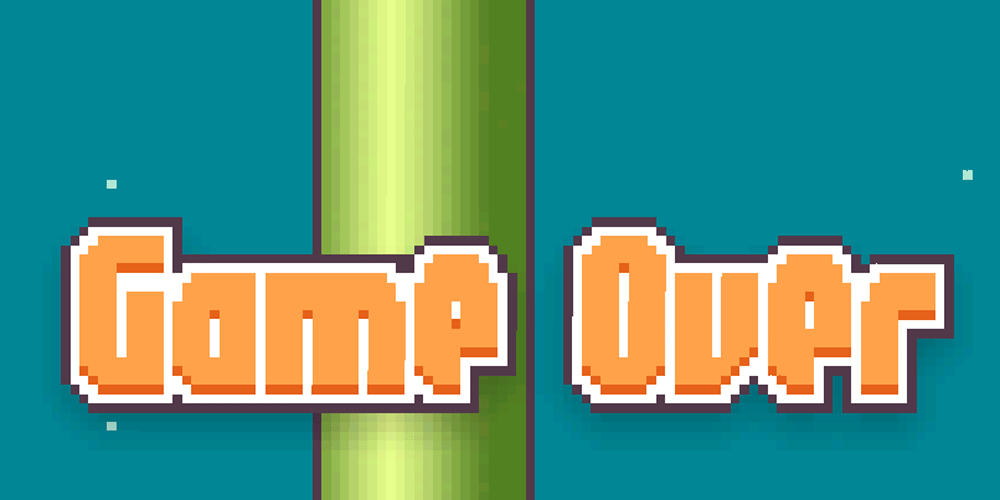
Image: Ursonate via Flickr
Flappy Bird, alas, is no more. The super-successful app has been pulled by its creator for a very good reason: he didn’t have the emotional bandwidth to deal with the popularity of the game and all that entails. While some have wondered if he pulled it for copyright infringement reasons, I’m taking Dong Nguyen at his word. He doesn’t have the time in his day nor the desire to deal with the constant emails and messages that come with developing a piece of popular software.
A lot of people could learn a thing or two from Nguyen.
Months ago, I started sending out what I call a canary-in-a-coal mine email when it comes to Kickstarter. People are asking me for money, and if they are, they better take the time to be accessible. If they don’t have the time or energy to deal with the outreach necessary to raise funding for a project, they probably shouldn’t undertake the project at that time. And frankly, with the fact that there is little recourse if the project isn’t delivered after raising the money, it behooves investors to do some research into what sort of developers they’re funding beyond the basics of the project: are they reliable, accessible, and most importantly, will they have the emotional bandwidth to see the project through to its end?
We look into projects reported by our community for guidelines violations and suspicious activity, and we take action when necessary. These efforts are focused on fraud and acceptable uses of Kickstarter, not a creator’s ability to complete a project and fulfill. On Kickstarter, people ultimately decide the validity and worthiness of a project by whether they decide to fund it.
So, my canary-in-a-coal mine message: I ask a good question that isn’t answered anywhere in the literature they’ve produced to describe their project. Sometimes it takes me a long time to come up with such a question; longer than it should ever take the person to answer it. And then I wait. Do I get a timely response? Do they answer my question adequately? Do they seem in over their head, or have they thought through what it means to be an entrepreneur?
There was a popular computer project right before Christmas that a lot of my friends were funding, but when I emailed the developer, I received crickets. I tried a second email, just in case the first one got lost in the shuffle and tweeted him. He favorited my tweet, but didn’t reply to it. While he was crowing about how great his project would be via Twitter and Facebook, he didn’t take the time to respond to my email. I decided not to fund the project. If the developer got his idea off the ground, it would be available for purchase down the road. And if he didn’t, I wouldn’t lose my money.
Kickstarter is about taking a risk, but there is risk and then there is ignoring warning signs. And to me, not being able to respond to emails is a warning sign that someone is in over their head. There’s a big difference between an inventor who can see a project through to its ends and a guy who happens to have a really cool idea.
The same idea goes for expensive apps or electronic toys that are already on the market. I’m happy to purchase an outlier product from a computer website or spend $10 on an app when I know that my questions will be answered if we run into a wall. But too many times, I’ve sent that canary-in-a-coal-mine email and received no response. In that case, we skip the app or software or toy. There are too many great items out there to spend money on those that can’t take the time to address customer service.
The leveled playing field of the Internet has turned everyone into a developer or inventor, and on one hand, that is a great thing. There are products and games that would never be made otherwise if they needed to get through the red tape of a big company. But on the other hand, there are a lot of developers who may have a great idea but no business sense. And that business sense is important if both the inventor and the customer are both going to be satisfied.
So I have a great respect for Dong Nguyen if he realized he was in over his head and got out of the game. Though I hope he gets the proper support team in place and returns to the app store in the future.
How do you decide whether or not to fund a project on Kickstarter or purchase a new tech toy or app?




For a while I would back games based on the reputation of the designer or the actual game publisher, but even that’s a gamble these days — I cite “A Duel Betwixt Us” as just one example of a simple card game now in the midst of some serious delays in delivery – https://www.kickstarter.com/projects/laurob/a-duel-betwixt-us
I no longer back documentaries — the folks behind “ReMade: The Rebirth of the Maker Movement” have now crossed over three years (3!) without the actual video documentary being completed – https://www.kickstarter.com/projects/1248388728/remade-the-rebirth-of-the-maker-movement
And I’m hesitant to back game apps these days as well. I have one (Robots Love Ice Cream) that will hit 3 years in July (2014) with no game deliverable in sight.
I think what Kickstarter gives us is a behind-the-scenes look at what companies have always experienced, but we would never know about delays because we bought our stuff on the shelves or the app store when it was ready, plain and simple. There have always been delays, I’m sure, in boardgames, apps, electronics, and music and videos, but Kickstarter gives backers a look behind the curtain at all the warts involved in taking a product from idea to fruition. The downside is that backers are often provided with unrealistic delivery dates that we then hold the Kickstarter project leaders responsible to honor. I’m all for a slight slip in dates, but I’ve got a dozen or more projects I’ve backed that have frustrated backers to no end. I think we’re going to start seeing this problem get worse and worse as more and more projects move to Kickstarter with people on the teams who have no experience with proper time estimations.
Not sure what the answer is… I know I’ve pulled back a little on how many projects I back. I’ve been burned by just a few, and I’m not wanting to be burned again. I’m sure it’ll happen again, but I’m being a lot more cautious with my money now, and I don’t think there’s anything wrong with expecting fast responses and much more detail from project managers.
Melissa — great article. I think your “response litmus test” is a fantastic idea. The other thing you can do is look over the comments section and see how heavily it’s populated and whether or not the developer is responsive. AND how often they post updates. I recently funded a card game and the owner of the project sends updates almost daily — and I would say the quality of those updates matter as well — are they written well and with intention?
I have only been disappointed once with a crowd-funded project and it was via IndieGoGo. The developer only submitted ONE update and never even bothered to thank his backers or provide further detail about the project once it was funded. I never received my awards, but worse than that (IMHO) I never even received follow-up information on where the project was at and where it was going.
Crowd-funding at its best is exciting, generous, and an economy all its own. At its worst, it’s a vanity project for someone way over his/her head.
I’ve funded several dozen Kickstarters (the majority for a coupla’ bucks here or there, except for a few that I really felt strongly about and I splurged) and unless there is a team of people working on the Kickstarter, the likelihood of collapse seems high. I think some creators have more enthusiasm than resources–thinking “the money will take care of it”. If I had a nickle for everytime someone says they’ve “learned a lot about maling and shipping” so it will “be better next time” I could fund my own Kickstarter!
I also like your litmus test idea. 🙂
This made me really think about my entrepreneurial aspirations. If I really do want to produce a product, I’m going to need to make not only the time to develop it, but also the time to support it.
Thanks!
I think it’s good to do research and see if the Kickstarter you’re supporting has someone who’s willing to field questions (as with your canary/coal mine experiment), but really the whole point of crowdfunding this way is to give someone a chance that might not otherwise have to produce something.
I find it disappointing when people speak as if it’s some sort of pre-order system. That’s not what it is. It’s a grassroots venture capital platform–and that comes with risks, both to the one accepting responsibility for the funds and the one supplying them. If you can’t handle that kind of uncertainty, then by all means, avoid crowdfunding these kinds of projects.
I’ve changed how I decide to fund based on several disappointments. I still haven’t seen the product from the very first thing I Kickstarted; I know that it is still in process, because I follow the artist’s other work and his Twitter. Basically, he was trying to bring his back catalog into a new medium and finish out that old story. Given that I follow his current work, I understand how the delays happened, but I’m a bit warier.
Anymore, I look for items from an established artist or team looking to do something different. I look at their stretch goals, and see if these are items that will need extra design, extra sourcing, extra printing, etc., and how they plan to handle that. I have one card game that I got in on early, because the idea seemed great. Then they added collector boxes, a dice game, a novella…it’s been almost two years now, and while I’ve seen some pretty pictures, none of it has shipped. Contrast that with the FATE Core rpg, which added a ton of settings, books, and add-ons. They lined up writers, resources, and plans. Some of the stretch tiers were even just “We’ll add someone else to help handle all this stuff”. Then, they provided early access to written material via PDF, and lined out shipping options for the rest (get everything at once, split it up as items become available, etc.). From that one, I’m sitting on a bunch of great material that may have been slightly off-track, but I knew what was happening with it every step of the way. There’s still some material to deliver, but it was always stated with realistic dates (“Add-on X will happen summer 2014”). You want to look at how to manage a Kickstarter, look at the Evil Hat crew.